 —————
—————
Hellraisers Journal – Friday April 19, 1912
London’s Labour Newspaper on Crew of Titanic: “We’re Proud of Them”
From the London Daily Herald of April 18, 1912:
—–
 —————
—————
Hellraisers Journal – Friday April 19, 1912
London’s Labour Newspaper on Crew of Titanic: “We’re Proud of Them”
From the London Daily Herald of April 18, 1912:
—–
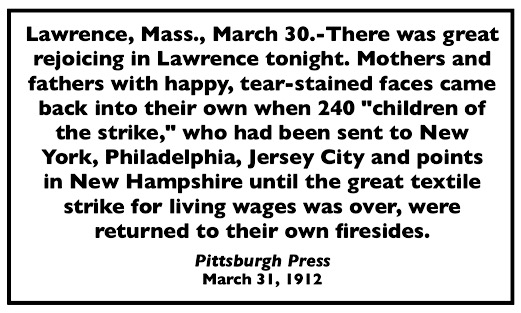 —————
—————
Hellraisers Journal – Monday April 1, 1912
Lawrence, Massachusetts – Strikers’ Children Welcomed Home
From The Boston Sunday Globe of March 31, 1912:
BY FRANK P. SIBLEY.
LAWRENCE. March 30-Into the swarming hundreds round the railroad station the train moved slowly, its bell ringing constantly. With shouts the police forced open a passage across the platform from the station door to the train steps. Women fought to get through that line of police. And then the children passed between train and station and were loaded into the waiting wagons.
If one shut his eyes and disregarded the temperature and forgot that the cries which shivered the air into raucousness were of joy and not of rage, he could imagine that the scene of the morning of Feb. 24 was being enacted again.
But no man could shut his eyes, and nobody could mistake the shouts of delight and the laughter and the excited chatter in a dozen tongues, and nobody could mistake the wine of Spring in the air for the bitter cold of a Winter morning, and if he could, the half-dozen enthusiastic bands which were tooting joyously in the background would tell him that this was the return of the children of the textile operatives to the battle ground where their fathers [and mothers] have won.
—————
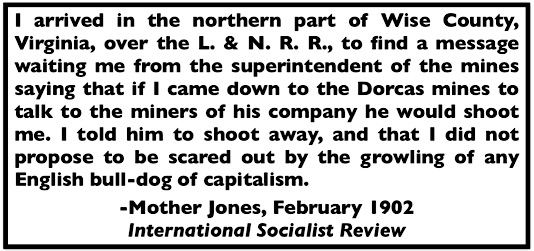 —————
—————
Hellraisers Journal – Wednesday March 19, 1902
Mother Jones News Round-Up for February 1902, Part II
Found Returning to West Virginia as Organizer for U. M. W. A.
From The Philadelphia Inquirer of February 16, 1902:
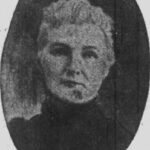
Mother Jones stopped over in the city yesterday on her way to the Southern coal fields, to the organization of which region she has been assigned by President Mitchell, of the United Mine Workers.
[Photograph added.]
From the Birmingham Labor Advocate of February 22, 1902:
It is interesting to note the progress being made by the organization of Textile Workers for the betterment of the workers in the textile industries, both North and South.
A national organization of these workers with affiliation with the American Federation of Labor was only formed last year, and delegates were accepted at the last convention at Scranton. The organization consists of the workers in cotton factories and knitting mills and their strides forward have been rapid and well taken. Quite a foothold has been secured in the Carolinas, particularly North Carolina, the Charlotte district being compactly organized.
[…..]
The condition of the textile workers are little understood, and if told in cold black type would probably create a furore….They are first robbed of all independence, planted in company houses, often fed from company stores and worked at the company’s will. The result is that the spirit of organization has hard ground to work over, but the Textile Workers’ organization is making headway.
Mother Jones, that noted woman who has devoted her life to the interest of the organization of labor and to the betterment of the conditions of the workers, and whose penchant seems to be the factory workers, came to Birmingham a few years ago and spent considerable time in the Avondale mills working as a weaver and trying to lay ground plans for an organization, but the time was not ripe; yet many of the facts that she made known have been most useful in the work now progressing…..
 —————
—————
Hellraisers Journal – Wednesday February 14, 1912
Lawrence, Massachusetts – More Children of Strikers to Leave City
From The Boston Daily Glob of February 13, 1912:
—–
—————
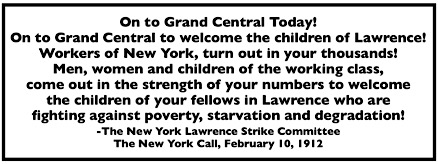 —————
—————
Hellraisers Journal – Monday February 12, 1912
New York, New York – Children of Lawrence Strikers Welcomed by Socialists
From The New York Call of February 10, 1912:
From The New York Times of February 11, 1912:
150 STRIKE WAIFS FIND HOMES HERE
—————
Great Throng Waits in Cold to Give Warm
Welcome to Children from Lawrence, Mass.
———-BANNERS OF RED WAVE
———-
And Crowd Sings the Marseillaise–Children Answer with Strikers’ Cry
–Homes Offered to Many More.
———-The Grand Central Station was the scene of a great demonstration last night when 150 boys and girls, ranging in age from 2 to 12 years, arrive here from Lawrence, Mass. They are the children of the striking textile workers, and they come here to be cared for by working people of New York, who have promised to feed and house them until peace has been restored in Lawrence and the great mills there are again in operation.
More than 700 persons applied for one or more of the children. Among them, it is said, were Mrs. O. H. P. Belmont, Miss Inez Milholland and Rev. Dr. Percy Stickney Grant. The children, however, were all given into the care of the families of laboring men or members of the Socialist Party.
To greet the children a crowd of 5,000 men, women, and children packed the Grand Central Station concourse, singing the “Marseillaise” in many tongues. They waved red flags, some with black borders, and all bearing Socialistic mottoes. It was noticed that not one in that crowd waved aloft the Stars and Stripes.
The men that waved the big red flags said they were not anarchist but Socialist flags, but, whatever they were, they were red everywhere except the lettering and the black borders. The black borders, it was said, were marks of mourning for those of the strikers who have lost their lives in Lawrence. Besides the flags, there were banners, also red, on which were displayed in big type what the crowd called “mottoes.” One painted in gold letters on a long, red streamer, read:
Ye exploiters, kneel down before the of your victims.
Another banner announced that the “libertarians of New York affirm their solidarity to the strikers of Lawrence.” Still another banner bore the same message, except that instead of “libertarians,” it read “the Liberians of New York,” &c. There was also another flaming piece of bunting on which was painted the information that certain Harvard students favored “a free country.”
Long Wait For the Children
The train on which the children were expected to arrive was due at 3:30 P.M., but it was an hour late, and it came in without any of the Lawrence Children. When it did roll in a brass band was playing in the concourse, and the crowd was lined up against ropes that were stretched for the purpose of preventing a too hearty welcome being given to the children.
The crowd did not understand why the children were not on the 3:30 train, and so great did the excitement become that the police had an inquiry made all along the New Haven line to Boston. It was learned that the children missed their train in Boston, and it was announced from the bulletin board that they would arrive on the train that was due at 5:42 P.M., but which would not get in until 6:50 P.M.
It was about 4 o’clock when the unwelcome information was bulletined and the crowd, which had stood for two hours in the bitter cold waiting for the train, dispersed to gather again about 6 o’clock in still greater force. At 6:30 P.M. the Grand Central concourse was packed to capacity, and the reserves of the East Fifty-First Street Station formed lines behind which the crowd was forced to stand until after the children had come out of the station.
At 6:50 the searchlight of the electric engine that pulled the train from Highbridge was sighted coming into the train shed. Then the excitement started in earnest. Slowly the hum of the “Marseillaise” started, gradually gathering in volume. It ended when the train came to a stop and then ensued a series of frantic shouts and yells in a dozen languages. In all the medley there was not heard a single English word except the sharp commands of the police and the station men who were assisting.
Announce Themselves as Strikers
Orders had been issued that the children were not to leave the train until the other passengers had left it and were safely out of the shed. When the children were escorted from the cars they were in charge of fourteen men and women from Lawrence, one of whom was a trained nurse. The children were formed in columns of twos, and at a signal from a young man who was one of those in charge they announced their arrival with a yell.
This is the way the yell goes, and the children shouted it all the way out of the station:
Who we are, who are we, who are we!
Yes we are, yes we are, yes we are.
Strikers, strikers, strikers.
 —————
—————
Hellraisers Journal – Sunday February 11, 1912
Lawrence, Massachusetts – Strikers Children Sent to New York City
From The Boston Daily Globe, Evening Edition, of February 10, 1912:
Upper Picture-Strikers’ Children from Lawrence in
South Station [Boston], Waiting to Board a New York Train.
Lower Left Hand-Child of a Striker. Lower Right Hand-
Miss Florence Sawyer, with One of the Youngest in the Party.
———-One hundred and seventy-five boys and girls, children of textile strikers in Lawrence, were brought to Boston this morning on their way to New York city, where they are to be cared for by different families until the strike is settled. The children left at noon for New York. They were to have departed on the 10:03 train out of the South Station, but they reached the North Station too late to make the connection. They went to the South Station by an elevated train, and from the time of their arrival at 10:30, until their departure, at 12, made the waiting room of the great terminal building lively with their songs and pranks.
The children were in charge of five women and 10 men. The man who conducted the party described himself as being Henry Lindworth, a Frenchman, who said he was “a comrade” and was “secretary in charge of the party.” Lindworth had a pocket full of letters from Socialist Democrats and plain Socialist in New York applying for one or more of the juveniles, whom they promised to give homes during the pendency of the strike. Each of the children had pinned to his or her garments a slip of paper on which was written the name, age and address of the child.
The children ranged in age from 4 to 14, and all of them seemed to be comfortably dressed, although the clothing of most was of rather poor quality, and some of them wore patches, but the little ones all seemed happy, and looked upon their trip as a great lark. They were ever ready to burst into song when Lindworth called on them to do so, which he frequently did. The song they most sang at the South Station was “La Internationale,” which Lindworth said was the hymn of those who are opposed to society as it is now constituted.
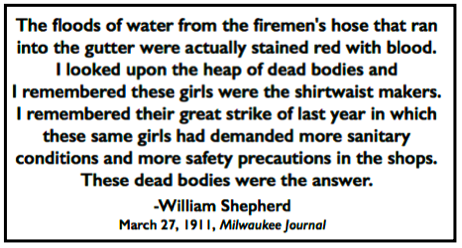 —————
—————
Hellraisers Journal – Tuesday February 6, 1912
The Triangle Shirtwaist Factory Fire: “God Did It” by Phillips Russell
From the International Socialist Review of February 1912:
A NEW YORK jury composed of capitalistic cockroaches has absolved Harris & Blanck of the murder of 147 young workers in the Triangle shirtwaist factory fire of March 25, 1911.
Harris & Blanck, the two bosses, were tried only for the death of one girl worker, according to the crooked ways of capitalist courts, and since “it couldn’t be proved” that they were responsible for this one girl’s death, they were freed.
A member of the jury afterward expressed himself as follows:
“I can’t see that anyone was responsible for the loss of life, and it seems to me that it must have been AN ACT OF GOD.”
Poor God! The capitalists have got him just where they have the working class-cornered! They tell us He can do all things. But there is one thing God can’t do, it seems-He can’t answer back. Else the moment this pitiful squirt uttered these words He would have rent the sky open, would have hurled His scepter aside, thrown off His robe, stepped down from His awful throne, taken this petty capitalist croaker by the throat, and rammed his statement back down him again.
Hasn’t God any manhood at all? How long will He continue to allow Himself to be made the goat for capitalist crimes? Or is His eternal silence a confession of guilt? If so, then it is time we were knowing. Is it God who has been up to the deviltry of all these years? Is it God who traps the worker in blazing factory or buries him in tomblike mine, without providing him with even one means of escape? Is it God who sends the sailor abroad in a rotten hulk of a ship and drowns him before he can leap from his foul bunk? Is it God who hurls the iron worker from his lofty perch a thousand feet to the stones below and mangles the brakeman and the machine hand into an unrecognizable mass, telling the weeping wives and children that He is very sorry but the dead men were guilty of contributory negligence? Is it God who takes into His tender care all that the worker produces and hands him back just enough to live on?
The capitalists say so. Their priests and preachers, their professors and editors, their teachers and other kept men, say so.
But we have begun to suspect. We have begun to see that the capitalists have created God in their own image. And He is running up a terrible account which some day He will have to settle with the working class of the world.
—————
[Emphasis added.]
 —————
—————
Hellraisers Journal – Saturday January 13, 1912
New York City – Haywood and Hillquit Debate Labor Question at Cooper Union
From The New York Call of January 12, 1912:
The first of a series of meetings for the discussion of the various problems confronting the Socialist party of America was held in Cooper Union last night with Julius Gerber, organizer of Local New York, which has arranged these meetings, presiding.
The big hall was jammed to the doors and the audience followed every word of the protagonists with breathless interest.
The meeting was a sort of family affair, only holders of red cards being allowed in the hall. A few Socialist Labor party men smuggled themselves into the crowd on borrowed S. P. cards. They were promptly recognized and Chairman Gerber asked that they leave the hall, which they did.
The subject of the discussion last night was “What shall the attitude of the Socialist party be toward the economic organization of the workers?”
William D. Haywood and Morris Hillquit were the debaters. Each of them was given an hour, the time being divided as follows: half an hour for the outline of the debate by each speaker, then each one got twenty minutes for rebuttal and finally ten minutes for closing the discussion.
Haywood opened the discussion. The burden of his arguments in the main was that the Socialist party should go among the workers and begin a propaganda for industrial unionism, for one big union. He assailed the American Federation of Labor and said that the Socialist party is acquiescing in the policy of the American Federation, which was a distinctly anti-Socialist and capitalist policy.
Industrial Form Superior, But-
Hillquit in his reply to Haywood said that there can be no question in the mind of any Socialist that the industrial form of organization is superior to the craft organization. But he did not believe that the Socialist should begin preaching industrialism outside of organized labor. The Socialist party, he said, should keep up its policy of trying to reach the workers in their present unions. The policy has been successful, Hillquit said, as is shown by the fact that every union affiliated with the American Federation of Labor has Socialists in important positions, as well as in the rank and file. These men have been elected to these positions by the rank and file, he said, because they were Socialists.
[…..]
Haywood’s Final Reply.
Haywood took the floor to reply in his final ten minutes.
He declared there is nothing in common between the policies of the American Federation of Labor and the Socialist party. The former, he said, is craft conscious as opposed to the class consciousness of the latter. He went on to show that by high initiation fees, curtailment of apprentices and even closing of books, membership is kept down and would-be members excluded…..
He went on to say that he had never advocated anything else but the organization of the workers as one man, and that he had believed and still believes the craft form of organization to be “ethically unjustifiable and tactically suicidal.”
At the same time he urged the necessity for political action, the political power to be used, not after the social revolution, but under present conditions, citing as an instance of its use the turning of the police against strikebreakers instead of against strikers.
Haywood explained that in criticizing the American Federation of Labor he criticized its leaders, who were members of the Knights of Columbus and of the Civic Federation executive.
Hillquit Finds Mystery Deep.
In taking the floor to close the debating. Hillquit declared that the mystery had deepened, seeing that Haywood did not oppose the rank and file of the A. F. of L. but the members of the Executive Committee of the Civic Federation…..
The difference between the speaker’s policy and Haywood’s, Hillquit declared, was that the former, while condemning the policies of Samuel Gompers, made efforts to educate the rank and file, while Haywood was ready to kick over and destroy the whole A. F. of L.
[…..]
[Emphasis added.]
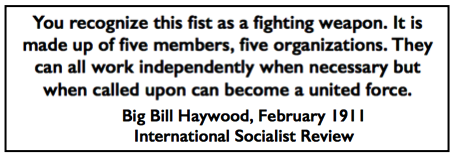 —————
—————
Hellraisers Journal – Saturday January 6, 1912
The New York City Street Cleaners Strike of November 1911, Part II
From the International Socialist Review of January 1912:
THE STRIKE OF THE SCAVENGERS
By WILLIAM D. HAYWOOD
[Part II of II.]
The city officials made every effort to break the strike, and although they resorted to the brutal tactics the employing and ruling classes are accustomed to use everywhere in like cases, they met with little success.
Detective agencies were enlisted and were paid $5 for each man they secured, the strikebreaker receiving for his services $3 per day. It requires at least three scabs to do the work of one husky garbage driver, in addition to the number of police required for guard duty. The change was an expensive experiment on the part of the city authorities.
There were many bitter popular demonstrations against the strikebreakers. One man was knocked senseless by a brick thrown from a near-by roof, and was then run over by a wagon that broke both of his legs. He died shortly after being taken to the hospital. A child was run over and killed by one of the mayor’s scabs. Some policemen were injured, but this is not worthy of particular mention, as they are all still alive. Many arrests were made and strikers were cruelly beaten.
One of the chief lessons to be learned is the inefficiency of scab labor. This is obvious on every hand. While no particular skill is required in the collection of garbage and sweeping of streets, it requires a certain physical standard that is not reached by the casually employed, who do the work slowly, gingerly, spilling at least a third on the street in their clumsy efforts. This same inefficiency prevails in every shop strike, but there the bosses are able to furtively conceal their helplessness behind closed doors. The spirit of many a strike has been broken by apparent success which perhaps is as much of a failure as New York’s strike-breaking department.
The importance of the least considered, even the scavenger in the machinery of modern living is another lesson to be learned. If this strike had occurred in the summer season the sweltering heat enveloping the piles of filth on the streets would have borne this home with deadly emphasis.
But the piles of garbage in the streets of America’s greatest city grew higher and higher. Abominable enough in other parts of town, the stench in east side streets was almost unendurable. So bad did the situation become that the Merchants’ Association issued an appeal to “good citizens” to come out and take the strikers’ places.
So frightened did the city officials become that they allowed the piles of garbage to be set afire, though this could not fail to do great damage to the streets and endanger lives and dwellings from flying sparks. Gaynor and Edwards declared they would never take the strikers back, but would turn over the street cleaning to· private contractors. Such is the deal handed to the workers under capitalist “municipal operation.”
The Socialist Party was quick to take a hand in the fight and held a big mass meeting in Cooper Union at which the treatment accorded the strikers was denounced.
The teamsters’ and truck drivers’ unions also pledged their “moral support,” but they didn’t give the strikers the kind of support they needed most. A general walk-out of all the teamsters in the city-“a stoppage of everything on wheels,” as one speaker put it-would have ended the fear of pestilence and won the garbage collectors’ strike for them in about one day. But that though “threatened,” never came.
[Emphasis added.]
 —————
—————
Hellraisers Journal – Friday January 5, 1912
The New York City Street Cleaners Strike of November 1911
From the International Socialist Review of January 1912:
[Part I of II.]
If 4,000 Wall street brokers or 4,000 assorted employers suddenly left their offices or were carried off by a pestilence in New York, the life and activities of that city, after the first sensation, would go on much as usual. Society and industry would proceed with but little interruption. But when 4,000 humble street cleaning employes suddenly quit work in the metropolis in the second week in November [1911] the entire administration of the second greatest city in the world was upset and for a time demoralized. High-salaried officials could do little but gnash their teeth be carried out. Rich and powerful merchants shrieked and groaned at the sight of the piles of odoriferous garbage standing untouched in front of their palaces of profit. Comfortable and well-fed householders and property owners held their noses and begged the agitated city government to do something. Four million people were threatened with pestilence and disease, which inevitably would have been widespread had not these despised and usually silent workers chosen a cold and freezing period in which to strike.
On the night of November 8 these garbage wagon drivers went out, their demand being a return to the daylight collection of garbage instead of the continental system of night work recently installed by Mayor Gaynor. The men contended that they were imposed upon by this continental system, the work at night being much more of a strain, and that in addition the hours had been increased from eight to ten or eleven without any additional pay.
When the demand for a change was first made of Commissioner Edwards the garbage cleaners received the following bulldozing reply, duly expressive of the feelings of a politician toward his underlings:
I understand that there is some dissatisfaction on the· part of the drivers on account of night work. I want the drivers in the Department of Street Cleaning to thoroughly understand that night work will go on as usual, and any absentees or men failing to· go to work will be dismissed from the Department of Street Cleaning and never be allowed to return.
Stable foremen will suspend any men failing to go to work and will forward charges to the main office.
WILLIAM H. EDWARDS,
Commissioner.This reply was backed up by the following communication from Mayor Gaynor to Edwards:
Sir: In regard to the threatened strike of the drivers and garbage collectors of your department, be so good as to notify them at once by general order to strike just as soon as they see fit. And see to it that not one of the strikers gets back into the city employment again. We can get along without them. It will inconvenience the householders for a few days, but they will stand it patiently. Let the contract system be resorted to, if necessary.
The city pays the men of your department the highest wages for the shortest hours, and in addition, a pension law was passed for them last winter. If they think they can make the city conform to their dictation by striking they will find themselves grievously mistaken. The city’s business has to be done as the charter prescribes, and no strike can force it to be done in any other way. The city is not in a position of a private employer and able to make any terms with its employes it sees fit.
W. ]. GAYNOR,
Mayor.In the face of official opposition and stern determination as expressed by the foregoing communications, the men themselves stood firm, with at least the result that the political scientists have a practical lesson to help solve as well as discuss.
Thousands of wagon loads of garbage were piling up in the streets, and in the congested districts of the east side there were some streets almost impassable. Extraordinary efforts were made to remove garbage from business centers and elite residential districts. It is in this instance as in all others that the poor and uninfluential are discriminated against. The fashionable localities looked fairly clean, while just a few squares away in the tenement districts the fermenting piles of cast-off filth were breeding disease germs that would first attack the poor, but that might indeed ravage the city.
[Emphasis added.]